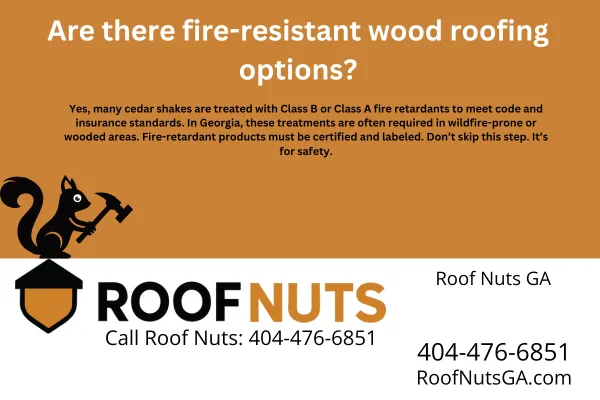
Are there fire-resistant wood roofing options?
Fire-Resistant Wood Roofing in Georgia: What You Need to Know
Short Answer:
Yes. Many cedar shakes and shingles are treated to meet fire safety codes. These fire-retardant wood products are available and often required in wildfire-prone or heavily wooded areas of Georgia.
What Makes Wood Roofing Fire-Resistant?
To increase fire resistance, cedar shakes and shingles are pressure-treated with fire-retardant chemicals. These treatments allow them to meet specific fire ratings:
Class B Fire Rating: Meets moderate fire resistance standards.
Class A Fire Rating: Offers the highest level of protection. Often achieved with treated shakes installed over fire-resistant underlayments.
These treatments must be certified by a recognized testing agency (such as UL or ICC-ES) and clearly labeled on the product.
Is Fire-Resistant Wood Roofing Allowed in Georgia?
Yes—but with conditions.
In cities like Atlanta, Augusta, Macon, and especially wooded areas like North Georgia, local building codes may require fire-rated roofing.
Most insurers also require fire-retardant treatments for cedar roofs to maintain coverage.
Always verify with your local building department and insurance provider.
How Can I Tell if My Wood Roof Is Fire-Rated?
Check for:
A certification label from a third-party testing agency.
A stamp or tag showing compliance with Class A or B standards.
Product data sheets from the manufacturer.
If your cedar shakes don’t have these labels, they’re not code-compliant in many parts of Georgia.
Does a Fire-Rated Label Affect My Insurance?
Absolutely.
Many insurance companies in Georgia won’t insure untreated wood roofs.
Fire-rated products may lower your premium.
It could also help you qualify for fire mitigation credits.
Is the Fire Retardant Permanent?
Most pressure-treated shakes are labeled “permanent,” but:
Exposure to rain and UV can wear the treatment down over decades.
Always verify that your fire-retardant treatment meets ASTM E108 or similar fire testing standards.
What Areas in Georgia Should Prioritize Fire-Rated Cedar Roofing?
North Georgia (Blue Ridge, Dahlonega): Dense forests, wildfire zones.
Atlanta suburbs with wooded lots (Roswell, Johns Creek).
Savannah and coastal regions with building code restrictions.
Macon and Columbus areas with a high volume of older wood-frame homes.
Why Is Certification So Important?
Installing a treated cedar shake roof without proper labeling can lead to:
Failed inspections
Denied insurance claims
Liability in the event of a fire
Certification isn’t just paperwork—it’s protection.
Need Help Deciding on the Right Roof?
At Roof Nuts, we help homeowners across Georgia choose fire-safe, code-compliant cedar roofing that meets both aesthetic goals and safety standards.
Call us at 404-476-6851 or visit RoofNutsGA.com to schedule your free roofing consultation.
Related Questions Homeowners Ask:
Can I install a cedar roof in Georgia?
Yes, but fire-rated treatments may be required depending on your location.
Do cedar shakes last as long as other materials?
With proper maintenance, they can last 30+ years—but fire-retardant versions may need occasional treatment inspection.
Are treated wood shingles more expensive?
Yes, they usually cost more than untreated shakes, but offer greater safety and meet insurance and code requirements.
Can you re-treat wood roofing over time?
Some field-applied treatments exist, but they don’t replace pressure treatment. Always choose factory-treated products for compliance.